Apr 12, 2025
Apr 12, 2025
Director: Krzysztof Kieslowski/ Poland/Polish /572 mts
"What is the true meaning of life? Why get up in the morning?
Politics doesn’t answer that."
— Polish director Krzysztof Kieslowski
The Decalogue, Kieslowski’s extraordinary, challenging collection of ten one-hour films made for Polish television in the dying days of the Soviet Union, doesn’t answer Kieslowski’s questions either. What it does is pose them as hauntingly and seriously as any cinematic effort in the last twenty years. "Everyone seems to accept the Ten Commandments as a kind of moral basis," Kieslowski has said, "and everyone breaks them daily. Just the attempt to respect them is already a major achievement."
Three decades after de Mille's movie "Ten Commandments" came out, Krzysztof Piesiewicz, a Warsaw civil rights lawyer, said to his friend, Krzysztof Kieslowski, the movie director: "Someone should make a film about the Ten Commandments. You should do it." Kieslowski first considered that a truly terrible idea, but then thought, "Maybe." He and Piesiewicz soon began work. They wrote 10 TV films, one per Commandment, each about an hour, 562 minutes in all. Collectively titled The Decalogue, it may be the best dramatic work ever done specifically for television, and the most impressive religious art produced in any field in the last three decades.
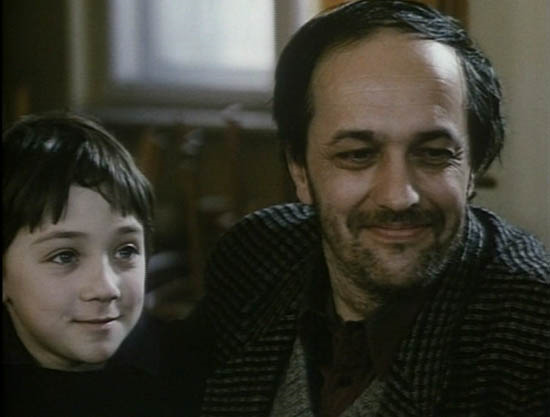
From Decalogue 1
Far from illustrating Old Testament laws with a thunderous drum-beating moralism, these 10 films, set mostly in the vicinity of a large, rather bleak apartment complex in Warsaw, might be described as metaphysical speculations. Without sermonizing or even trying to prove the existence of a divine power operating in the universe, these oblique dramatic parables imagine lives influenced by unseen forces whose intentions can't be predicted or even begun to be grasped.
Here is the brief summary of each of the ten films contained "The Decalogue"
Decalogue 1:
"I am the Lord thy God;
thou shalt have no other gods before me."
Krzysztof introduces his small son, Pawel, to the mysteries of the personal computer, a machine which he believes is infallible. It is winter. Pawel, anxious to try out his new pair of skates, asks his father if he can go out to the local pond which has just frozen over. They consult the computer; the ice will hold the boy's weight; he can go. Pawel doesn't come home. There was a freak local thaw; the computer was wrong; Pawel drowned. Krzysztof runs to the church in protest and despair, falls against an altar. Candle wax splashes over the face of the black Madonna and dries on her cheeks as tears.
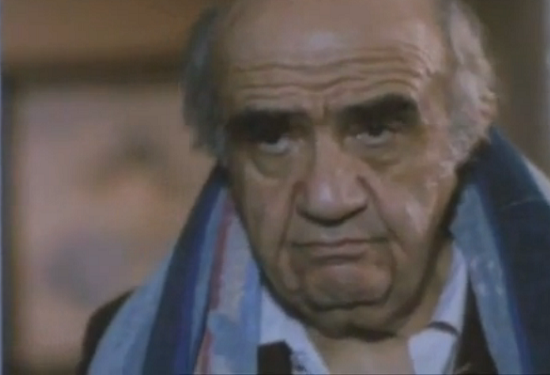
From Decalogue 2
Decalogue 2:
"Thou shalt not take the name of the Lord they God in vain."
Dorota visits Andrzej, her dying husband, in the hospital. She is pregnant - this might be the last chance for her to have a baby - but not by him. She asks the Consultant in charge of her husband's case whether Andrzej will die. If he lives, she will have an abortion; if he dies, she can have the child. How can the doctor decide the life or death of an unborn child? How can he be certain whether his patient will die or miraculously recover? He tells Dorota that her husband doesn't have a chance; but Andrzej recovers. Dorota tells Andrzej that they are going to have a baby; he thinks it's his.
Decalogue 3:
"Remember the Sabbath day, to keep it holy."
Christmas Eve, a night when families are together and nobody wants to be alone. Ewa tricks Janusz, her ex-lover, away from his family and under various pretexts tries to keep him with her for the night. Janusz wants to go home but Ewa is determined. They part at dawn.
Decalogue 4:
"Honor thy father and thy mother."
Anka is 20 years old. Her mother is dead and she lives with Michal, her father. They get on well together. Michal has to go on a trip abroad. While he is away, Anka finds an envelope in her father's room: 'Not to be opened before my death.' Within that envelope is another, addressed, in her mother's handwriting, to her. Anka meets her father on his return and quotes the letter where her mother reveals that Michal is not Anka's real father. A different relationship emerges between Anka and Michal as Anka subtly tries to seduce him. Michal resists; she might still be his daughter. As Michal leaves for another trip, Anka runs after him, confessing that she hasn't read the letter after all.
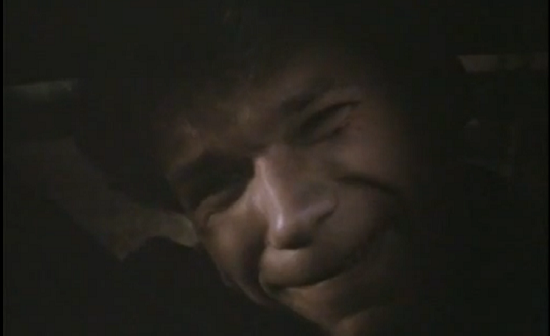
From Decalogue 5
Decalogue 5:
"Thou shalt not kill."
A youth, randomly and brutally, murders a taxi-driver. Piotr has just passed his law exams and been admitted to the bar. He is to defend Jacek, the young murderer. There is no evidence for the defense, and no apparent motive. Jacek is put on trial, found guilty and executed by hanging. Piotr, after his first case, is left with the bitter doubt - does the legal system, in the name of the people, have the right to kill in cold blood?
Decalogue 6:
"Thou shalt not commit adultery."
Tomek, a young post office worker, is obsessed with Magda, the promiscuous woman who lives in the tower block opposite. He spies on her through a telescope and finally declares his love. She initiates him into the basic fact of life - there is no love, only sex. Tomek, shattered, tries to commit suicide but doesn't succeed. When he returns from the hospital, it is Magda who becomes obsessed with him.
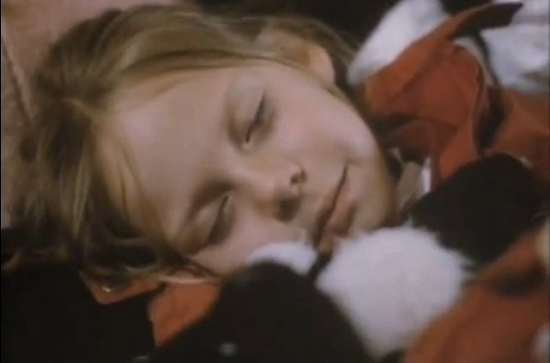
From Decalogue 7
Decalogue 7:
"Thou shalt not steal."
Six-year-old Ania is being brought up by Ewa in the belief that Majka, Ewa's daughter, is her sister, whereas Majka is really her mother. Tired of living this lie and desperate to have Ania love her as a mother, Majka 'kidnaps' Ania and runs away from her parents. She seeks refuge with Wojtek, Ania's father. Majka was just a schoolgirl when Wojtek, her teacher, got her pregnant. Ewa, jealous of Ania's love, looks for her everywhere, phones Wojtek. Majka seizes her little girl and continues to run; she will only return home if her mother allows her to bring up her own daughter in the recognition of the true relationship. Majka and Ania hide at a nearby station. Ewa asks the woman at the ticket office whether she has seen a young woman with a little girl. The ticket woman lies - yes, she did see them but they left some two hours ago. In the background, Ania wakes up and sees Ewa. 'Mommy,' she calls and runs to her. A train arrives, Majka jumps on, rejecting Ewa's pleas for her to come home.
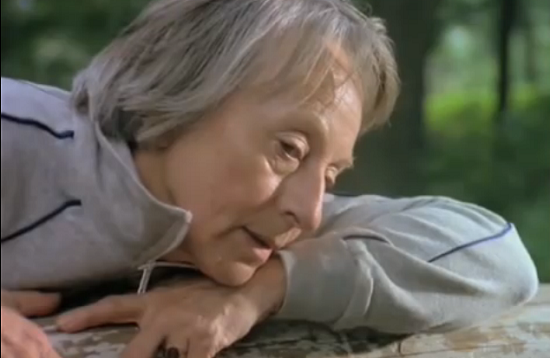
From Decalogue 8
Decalogue 8:
"Thou shalt not bear false witness against thy neighbor."
Elzbieta, researching the fate of Jewish war survivors, is visiting from New York and sits in on lectures in ethics at the University of Warsaw. She approaches Zofia, the professor, and tells her that she is the little Jewish girl whom Zofia refused to shelter from the Nazis during the Occupation. As Zofia explains the reason for this is apparent cowardice - someone had betrayed Zofia's husband who was active in the underground and any Jewish child would have fallen into the hands of the Gestapo - her long-standing sense of guilt is cleared while Elzbieta's faith in humanity is restored.
Decalogue 9:
"Thou shalt not covet thy neighbor's house."
Roman learns he's impotent. Recognizing his wife, Hankas's, sexual needs, he encourages her to take a lover. She is reluctant; she loves Roman, but does have an affair with Mariusz, a student. Roman, despite his own words, becomes excessively jealous and obsessed with the thought that Hanka might have followed his encouragement and taken a lover. He spies on her and learns of her relationship with Mariusz, unaware of the fact that Hanka has broken off the affair. Roman tries to commit suicide but survives. Hanka rushes to his side.
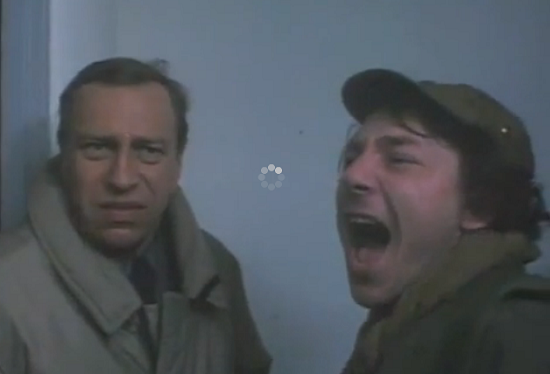
From Decalogue 10
Decalogue 10:
"Thou shalt not covet thy neighbor's wife, nor his manservant, nor his maid, nor his goods, nor anything that is your neighbor's."
A man dies leaving an extremely valuable stamp collection to his two sons, Jerzy and Artur. Although they know very little about stamps, they are unwilling to sell. They learn that one very rare stamp is needed to complete the valuable set. To acquire the stamp Jerzy donates his kidney - the man in possession of the stamp is in need of a kidney for his daughter. Returning from hospital, Jerzy and Artur find that they have been burgled. The entire stamp collection is gone. Shamefully, they confess that they suspected each other and are reconciled.
Kieslowski, a compassionate director, chooses to conclude this dramatic and unique series on the Ten Commandments not with a bang but with the redeeming sound of laughter. The final message of The Decalogue is that no matter what our flaws or our failures, no matter how many commandments we have violated, we are given the strength and the courage to pick ourselves up off the floor and begin again.
Although “The Decalogue” explore moral questions, they do so in the context of disordered, sometimes dysfunctional lives of a modern, generally a religious urban populace. Kieslowski never preaches, and seldom even seeks explicitly to clarify lines between right and wrong, but the prevailing mood is somber and downbeat, the general sense of something having gone wrong unavoidable. Like much of the Old Testament, The Decalogue is a chronicle of human failure.
But unlike the Old Testament, The Decalogue chronicles human failure without seeking to put it all in context, to persuade its audience to live morally, or even to define what that means. There is no apologia here for the Ten Commandments; characters break the commandments, but there is generally no particular effort to persuade the viewer of the wrongness of doing so, or to show the harmful consequences that follow. That doesn’t mean the morality of the situation is neither here nor there — far from it — only that the film challenges the viewer to grapple with the morality of complex situations without providing an answer key.
Shot with a visual economy and brutality of style which grew out of Kieslowski's work in documentary, The Decalogue is at once profoundly wise and unflinchingly honest. Each individual film is a self-contained masterpiece, almost aphoristic in their brevity and understated rhetoric. These ten films are the greatest achievement of European film making in the last thirty years.
A series of "Hundred Favorite Films Forever"
04-Dec-2012
More by : P. G. R. Nair